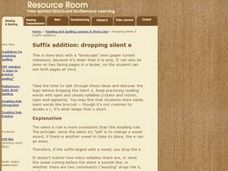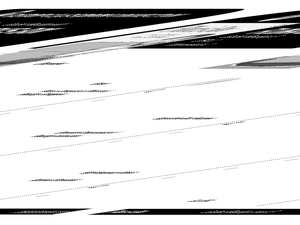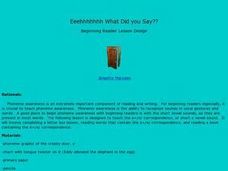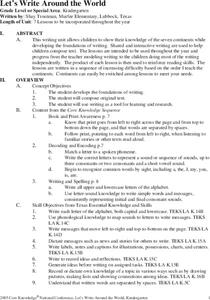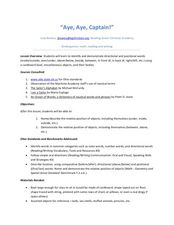Curated OER
Let's Read and Read!
Pupils discover how to hold their mouths to form the /o/ sound and that it may be hidden in different words. They say /o/ and then repeat a tongue twister that contains many /o/ words and practice writing it on primary lined paper. They...
Curated OER
Open Wide
First graders make the sound of /o/ relating it to the sound they make when the doctor asks them to open their mouth and say "ahhhh". They think of different words that contain the /o/ and identify it as it is used in a sentence and...
Curated OER
What's Behind the Creaky Door?
First graders are introduced to the concept that letters stand for the mouth moves that we make when sounds are made. They practice making the /e/ sound and compare it to the sound a creaky door makes and then try saying the tongue...
Curated OER
Here's and Instant Activity for October 20, 2008
Students complete spelling activities for words with or and ore spellings. In this spelling lesson, students find antonyms for the 'or' words in the first exercise. Students find synonyms for the second exercise.
Curated OER
Letter Names
Students explore language arts by participating in a letter identification activity. In this word recognition lesson, students are shown a list of vocabulary terms which they practice reciting with their classmates. Students identify and...
Curated OER
Phonics Activity
In these phonics worksheets, students complete 7 different activity activities that help them learn word sounds including vowels and consonants.
Curated OER
Suffix Addition: Dropping Silent "e"
High schoolers engage in a lesson that is concerned with the concept of using the silent "e" in certain words. They practice using the rules while reading them in a review. The application of the rule is given in the lesson and can be...
Curated OER
Guided Reading: Flora's Box
Young readers consider text-to-self connections. Learners discover the text-to-self connection as they read Flora's Box by Tina Althaide. They practice high frequency words, prepositions, and 1:1 correspondence.
Curated OER
The Letter O
In this letter O worksheet, learners determine whether an underlined word had the long or short o sound, circling the correct answer.
Curated OER
Vowel Change of Short E
In this language arts worksheet, students look for the pattern for changing the vowel "E" into the right form for writing the words in the Latin language.
Curated OER
"Whaaa" Said The Baby"
Young scholars recognize phonemes that correspond with the letters in the alphabet. They focus on identifying the short a, /a/ sound. They examine the way their mouths move when making the short a sound mimicking a baby's cry. In given...
Curated OER
Eeehhhhhhh What Did you Say??
Student read pseudo words containing the e=/e/ correspondence and recognize sounds in vocal gestures and words. They explore the e=/e/ correspondence, or short e vowel sound and complete a letter box activity, reading words that contain...
Curated OER
Grandpa Ed
Students engage in an emergent literacy lesson that focuses on phonemic awareness. For practice they become more comfortable with a short vowel phoneme, which can often be the most difficult to identify, by learning it in isolation.
Curated OER
Let's Help the E Out!
Students explore the short /e/ sound. They practice making the sound, noticing how their mouths move to make the sound. They use letterboxes to spell and write 'e' words. They listen for the /e/ sound in a story and then write their own...
Curated OER
Doo-Wop Pop
Doo-Wop Pop, by Roni Schotter is story that focuses on music and performing arts. Language arts activities include phonics, music, writing about dreams, poetry, and writing a letter are included in this literature guide. Furthermore...
Curated OER
Let's Write Around the World
Students participate in an ongoing writing project about the seven world continents. In this continents writing lesson, students work on an interactive game to write about the seven continents. Students locate the continents on the map....
Curated OER
Say Aaaaa for Apple
Young scholars say words by blending sounds and phonemes. They decode words in order to read and identify and understand the letter a. This phoneme /a/ is one of the short vowels that are needed to read and write. They will show...
Curated OER
Voicing and Syllable Length (Using Rubber Bands)
Students identify voiced and unvoiced sounds. They practice using short and long vowel sounds. They identify consonants only after paying attention to the length of vowels. They use rubber bands to help them determine the difference...
Curated OER
Iggy and the Icky Sticky Inchworm
Students read and spell words. They have to recognize that letters stand for phonemes and spellings map out spoken words. Long and short vowels are hard to recognize and this lesson focuses on that. The short i is taught in the...
Curated OER
Icky Fingers
Students are introduced to digraphs so they can match letters to their phonemes. They recognize the short vowel i=/i/ in both spoken and written words by practicing reading and spelling words containing /i/. Elkonin Letter Boxes are...
Curated OER
Ellen the Elephant
Students build their sight vocabulary. They study the short vowel correspondence e. They practice pronouncing the /e/ phoneme when shown the grapheme e in written words. They read e = /e/ and write words that contain the e...
Curated OER
Language Arts: Sound Recognition
First graders practice the short i sound by repeating tongue twisters. Later they write the letter i by using the analogy of drawing a straight line from the "fence" down to the "sidewalk" and putting a "basketball" above it. Other...
Curated OER
"Ehhh" I can't hear you!
Students practice writing, sounding out, and identifying words using the short "e" sound. They listen as the teacher reads a tongue twister emphasizing short "e" beginning sounds. The stuents then participate in an activity in which...
Curated OER
Aye, Aye Captain
Learners investigate how correspondences appear differently in different words. They also recognize the difference between long and short vowels. Students study how these correspondences are spelled and pronounced differently.








